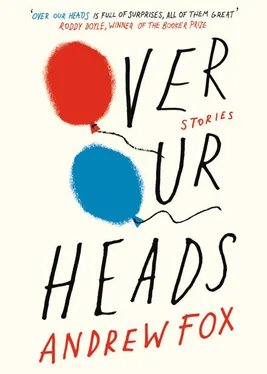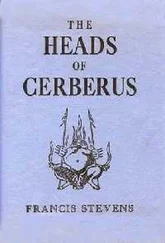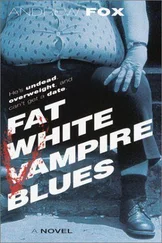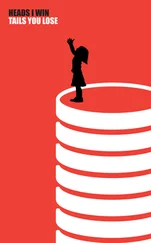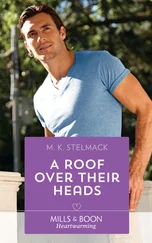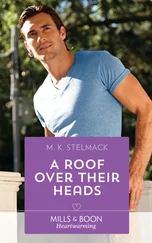The office-building job was meant to be a week-long affair, but we got ahead of schedule. We worked hard all Thursday morning and packed it in by lunch, leaving the final floor, the top one, for the following day. I asked the lads not to tell anyone I’d let them go early, then spent the rest of the day walking around and drinking. I was restless for some reason. I hadn’t been sleeping well. I kept thinking I saw someone I recognized in crowds or in the shadows.
On the side of a hotel on Amiens Street, I saw a figure that bore a striking resemblance to the ones painted in the office building. Like them he was faceless, like them he was thin and tall. He was obviously relaxing after a hard day. He wore his collar open, his tie loosened, and held his jacket over his shoulder. Where would he be going? I wondered. Home to a wife and kids? Or, like me, off aimlessly into the night? I decided that he did in fact work at our office building, and giggled at the thought of him and his co-workers clocking off when we did and heading out into their lives, bedding down for the night in their cosy homes and getting up earlier than us and beating us to the quays.
By seven o’clock, I’d crawled for miles between the pubs around the docks and over the river and back home to Irishtown. I had six or seven pints in me already by the time I pulled up a stool in the Oarsman. This was a classic pub, full of walnut wood and thick carpet and heavy optics and brass fittings. Over the course of my wanderings the cold had got in between my bones and skin, and something like nerves was making my mind feel scratchy. I added whiskeys to the pints for the sake of heating and anaesthetic and stayed in the pub until closing. Then I fell up the street, puked my ring in the bathroom sink and conked out with my cheek pressed against the cold tiles.
Friday morning I felt unsteady on the road. I scared myself with the way my hands shook on the wheel.
‘Long night?’ said Graham, climbing in. He looked a little worse for wear himself. His eyes were baggy, and he was wearing the same clothes he had worn the day before but now there were red blotches on his shirt and scuff marks on his knees.
Tony had brought coffees for everyone.
‘You’re a lifesaver,’ Graham said.
‘Just to mark my last day. Tomorrow I’m a free man.’
Tony’s face was clear and open, his eyes bright. He was freshly shaven and had a new, clean haircut.
‘Is that right?’ Kevo said.
I looked at the docket. ‘That’s right.’
‘Don’t go easy on him now just ’cause he’s nearly done,’ Graham said. ‘Work the bastard.’ He sipped his coffee. ‘This is grand though, Tone. Cheers.’
I drove us along the quay, with the windows open to air out my head. Glass buildings caught the light. Pedestrians jostled in the intersections drinking coffees from takeaway cups. And for a moment I felt as though we belonged among them, that we were part of a society, heading off to our jobs to make our humble contributions.
I parked the van and the lads hauled the equipment into the lobby. That vast, empty space swallowed the city’s hustle and honk. The building felt embarrassed, like somehow we’d caught it off guard. We shouldered our bags and climbed the stairs, peering in at each landing to the open space and the walls we had cleaned. Just before the fourth-floor landing, we noticed a crumpled body painted on the stairs.
‘Was that there before?’ I said.
Kevo moved ahead. ‘Someone’s been in here,’ he called back.
‘Ah, for the love of fucking Jesus,’ Tony said.
Graham pushed past me. ‘Not much hope of you getting off lightly today, Tone.’
The branches of the potted plants by the windows now appeared broken. A litter of leaves and splintered wood had been added to the ground. The screens of desktop computers were smashed and their towers turned over. A printer lay on its side. Sheets of paper hung in the air. We looked into the faces of the office workers and saw new expressions of horror. The women were on their knees, hands up, begging. The men were frozen running or slumped against the walls. Bodies lay broken on the floor, their limbs folded at skewed angles. And everywhere there were messages, their letters scrawled and dripping. Help us, they said. Please, they said. Don’t do this, they said. I turned and looked back the way we’d come and saw, painted on either side of the stairwell door, two masked men dressed all in black.
‘Dear God,’ Tony said. ‘This is meant for us. What sick —’
‘Anarchists,’ Graham said, grinning.
‘Christ,’ Tony said, his eyes closed, ‘will you ever just fucking shut up?’
Graham licked his lips and took a calm step forward. Tony was a solid guy — he’d been a rugby player in his student days — but I could tell that he was frightened. The look in Graham’s eyes scared me too: it was not just that he wanted to inflict pain; he was eager to be hurt himself.
‘Lads,’ Kevo said, stepping between them. I helped him pull them apart and sent Tony to the other side of the floor.
‘Careful,’ I said, ‘the both of you, or I’m writing you up.’
I listened to Tony’s footsteps echo, and wanted desperately to leave, to make a run for the stairwell and to fall into a pub. Graham elbowed Kevo off and spat on the floor in Tony’s direction. He picked up a bucket.
‘Are we working or what?’ he said.
Graham and Kevo started to scrub the walls. I suited up and helped them. We erased the furniture and the messages, the twisted faces, the groping hands. I held the ladder for Graham and took turns hosing the run-off with Kevo. We worked right through lunch with no talk and no radio, but at three o’clock Tony took it upon himself to go out for sandwiches. Graham accepted one soundlessly, and we ate them as we worked. We continued into the evening long after we were obliged to do so, and when the light began to fail I fetched torches from the van and we took turns holding them. It was nine o’clock by the time we’d finished and packed the van. We stood around outside, each of us wanting to leave but needing first to say or to hear something meaningful.
‘Sorry about this morning,’ Tony said.
‘You will be,’ Graham said, but there was nothing in it.
‘Listen.’ Tony looked at me from the tops of his eyes. ‘Will you —’
‘We’ll say no more about it.’
I stood for a while and looked up and down the quays. The office blocks were dark but for the desk lamps of a handful of midnight-oilers. The river was high, black, and pulled with it a biting wind.
‘But you two,’ I turned to Graham and Kevo. ‘I’ll see you on Monday.’
I set off in the direction of human voices and found myself, some hours later, slumped on a high stool in a pub in Temple Bar, hating the expensive drink and the baseball caps for sale, the faded international currency pinned behind the bar, the dickhead playing Oasis covers over a jangling PA.
‘We should all be ashamed of ourselves,’ I said to no one in particular. I pointed myself in the direction of a greasy-haired manager who was leaning on the hatch talking to a floor girl. ‘This place doesn’t deserve to exist,’ I said. ‘It’s a fucking fake.’
The manager frowned and puffed out his chest. The floor girl came shuffling over.
‘You should go home,’ she said.
In the ensuing months, I got flung out to Blanchardstown and Balbriggan and Clonskeagh and Kilcock. I’d drop the new lads off, head to the pub and come back for them five or six hours later. More than once, one of them had to drive us back to Dublin, and when they stopped showing up in the mornings I knew I couldn’t report them.
One morning there was no one waiting at all and so, sick from drink, I drove to the assigned site, pulled on the overalls, poured the bitter chemicals and scrubbed away all day by myself. I drove back to town, dropped the van at the depot and walked home along Pearse Street studying my hands. The pigment I’d pulled from the wall had soaked into them and darkened. My skin was grey, its creases black at the knuckles. A mark like that of high tide scummed the balls of my wrists.
Читать дальше
